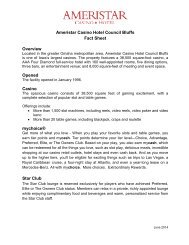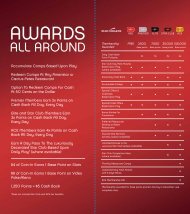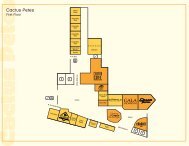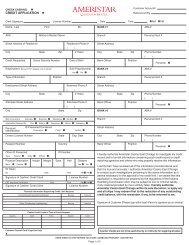Additionally, a $200 million casino development project in Vicksburg has received preliminary approval fromthe Mississippi Gaming Commission, but it is not currently known if or when this development will occur.There have been discussions in Colorado regarding a possible November 2008 statewide ballot initiative thatwould allow slot machines at some of the state’s racetracks. Two of the racetracks are located in close proximity toDenver, which is the largest market for <strong>Ameristar</strong> Black Hawk. The legalization of slot machines at these locationswould have a material adverse impact on <strong>Ameristar</strong> Black Hawk’s business.Native American gaming facilities in some instances operate under regulatory and financial requirements that areless stringent than those imposed on state-licensed casinos, which could provide them with a competitive advantageand lead to increased competition in our markets. In December <strong>2007</strong>, the NIGC approved the request of the PoncaTribe of Nebraska to have a five-acre parcel owned by the Tribe in Carter Lake, Iowa, located five miles from<strong>Ameristar</strong> Council Bluffs, approved for the operation of gaming. The State of Iowa is reportedly contemplatingchallenging the NIGC’s decision in federal court. If the Tribe is allowed to conduct gaming at this location, theadditional competition would adversely affect our Council Bluffs business.From time to time, state legislatures consider legislation that would allow various forms of Native Americangaming in close proximity to our properties. Additionally, two federally recognized tribes have asserted land claimsin Colorado and are attempting to have land in metropolitan Denver placed in trust by the federal government to beused for casino gaming.The entry into our current markets of additional competitors could have a material adverse effect on ourbusiness, financial condition and results of operations, particularly if a competitor were to obtain a license to operatea gaming facility in a superior location. Furthermore, increases in the popularity of, and competition from, Internetand other account wagering and gaming services, which allow customers to wager on a wide variety of sportingevents and play Las Vegas-style casino games from home, could have a material adverse effect on our business,financial condition, operating results and prospects.If the jurisdictions in which we operate increase gaming taxes and fees, our results could be adverselyaffected.State and local authorities raise a significant amount of revenue through taxes and fees on gaming activities.From time to time, legislators and government officials have proposed changes in tax laws, or in the administrationof such laws, affecting the gaming industry. Periods of economic downturn and budget deficits, such as are currentlybeing experienced in many states, may intensify the efforts of state and local governments to raise revenues throughincreases in gaming taxes.In Colorado, the Colorado Limited Gaming Control Commission has the authority to establish the gaming taxrate on an annual basis, up to a maximum rate of 40% of gross receipts, without further legislative action. Thecurrent rate of 20% on gross receipts over $15 million has been in effect since 1996.If the jurisdictions in which we operate were to further increase gaming taxes or fees, depending on themagnitude of the increase and any offsetting factors (such as the elimination of the buy-in limit in Missouri), ourfinancial condition and results of operations could be materially adversely affected.Our business is subject to restrictions and limitations imposed by gaming regulatory authorities that couldadversely affect us.The ownership and operation of casino gaming facilities are subject to extensive state and local regulation. TheStates of Missouri, Iowa, Indiana, Mississippi, Colorado and Nevada and the applicable local authorities requirevarious licenses, findings of suitability, registrations, permits and approvals to be held by us and our subsidiaries.The Missouri Gaming Commission, the Iowa Racing and Gaming Commission, the Indiana Gaming Commission,the Mississippi Gaming Commission, the Colorado Limited Gaming Control Commission and the Nevada GamingCommission may, among other things, limit, condition, suspend, revoke or not renew a license or approval to ownthe stock of any of our Missouri, Iowa, Indiana, Mississippi, Colorado or Nevada subsidiaries, respectively, for anycause deemed reasonable by such licensing authority. Our gaming licenses in Missouri need to be renewed every30
two years, our gaming licenses in Iowa, Indiana and Colorado must be renewed or continued every year, and ourgaming license in Mississippi must be renewed every three years. If we violate gaming laws or regulations,substantial fines could be levied against us, our subsidiaries and the persons involved, and we could be forced toforfeit portions of our assets. The suspension, revocation or non-renewal of any of our licenses or the levy on us ofsubstantial fines or forfeiture of assets could have a material adverse effect on our business, financial condition andresults of operations.To date, we have obtained all governmental licenses, findings of suitability, registrations, permits and approvalsnecessary for the operation of our currently operating gaming activities. However, gaming licenses and relatedapprovals are deemed to be privileges under the laws of all the jurisdictions in which we operate. We cannot assureyou that our existing licenses, permits and approvals will be maintained or extended. We also cannot assure you thatany new licenses, permits and approvals that may be required in the future will be granted to us.Financial leverage may impair our financial condition and restrict our operations.As of December 31, <strong>2007</strong>, we were required to maintain a leverage ratio, defined as consolidated debt divided byEBITDA, of no more than 6.25:1, and a senior leverage ratio, defined as senior debt divided by EBITDA, of nomore than 5.25:1. As of December 31, <strong>2007</strong> and 2006, our leverage ratio was 5.07:1 and 3.33:1, respectively. Thesenior leverage ratio as of December 31, <strong>2007</strong> and 2006 was 5.07:1 and 3.32:1, respectively. Our total indebtednessincreased from $883.0 million as of December 31, 2006 to $1.6 billion as of December 31, <strong>2007</strong>, primarily due toadditional borrowings to fund the acquisition of Resorts East Chicago in September <strong>2007</strong>. As we proceed with ourongoing and planned capital improvement projects, we expect our total debt to increase further. Without any changeto our senior credit facilities or obtaining subordinated debt, we may exceed the maximum permitted senior leverageratio in 2008. We anticipate that any amendment to the senior credit facilities would result in an increase inadditional costs and/or fees.The degree to which we are leveraged could have important adverse consequences to our business, including:• <strong>Inc</strong>reasing our vulnerability to general adverse economic and industry conditions;• Limiting our ability to obtain additional financing to fund capital expenditures and acquisitions, particularlywhen the availability of financing in the capital markets is limited as is now the case;• Requiring a substantial portion of our cash flows from operations for the payment of interest on our debt andreducing our ability to use our cash flows to fund working capital, capital expenditures, acquisitions, stockrepurchases, dividends and general corporate requirements;• Limiting our flexibility in planning for, or reacting to, changes in our business and the industry in which weoperate; and• Placing us at a competitive disadvantage to less leveraged competitors.The agreement governing our senior credit facilities contains covenants that may restrict our ability to, amongother things, borrow money, pay dividends, make capital expenditures and effect a consolidation, merger or disposalof substantially all of our assets. Although the covenants in our senior credit facilities are subject to variousexceptions that are intended to allow us to operate without undue restraint in certain anticipated circumstances, wecannot assure you that these covenants will not adversely affect our ability to finance future operations or capitalneeds or to engage in other activities that may be in our best interest. In addition, our long-term debt requires us tomaintain specified financial ratios and satisfy certain financial condition tests, which may require that we take actionto reduce our debt or to act in a manner contrary to our business objectives. A breach of any of these covenantswould result in a default under our senior credit facilities. If an event of default under our senior credit facilitiesoccurs, the lenders could elect to declare all amounts outstanding thereunder, together with accrued interest, to beimmediately due and payable. In addition, our senior credit facilities are secured by first priority security interests onsubstantially all of our real and personal property, including the capital stock of our subsidiaries. If we are unable topay all amounts declared due and payable in the event of a default, the lenders could foreclose on these assets.31
- Page 3 and 4: Dear Fellow Shareholders,I am pleas
- Page 5 and 6: Ameristar Black Hawk, which reporte
- Page 7 and 8: UNITED STATES SECURITIES AND EXCHAN
- Page 9 and 10: Unless the context indicates otherw
- Page 11 and 12: Ameristar St. Charles. Ameristar St
- Page 13 and 14: Ameristar Vicksburg. Ameristar Vick
- Page 16 and 17: Kansas CityAmeristar Kansas City co
- Page 18 and 19: Should additional gaming developmen
- Page 20 and 21: The Missouri Act provides for a buy
- Page 22 and 23: Iowa has a graduated wagering tax e
- Page 24 and 25: The Indiana Act provides that the s
- Page 26 and 27: after receiving notice that a perso
- Page 29 and 30: Pursuant to an amendment to the Col
- Page 31 and 32: There are various classes of retail
- Page 33 and 34: The Nevada Commission may, at its d
- Page 35: Item 1A. Risk FactorsThe gaming ind
- Page 39 and 40: We have limited opportunities to de
- Page 41 and 42: The Ameristar Vicksburg site has ex
- Page 43 and 44: PART IIItem 5. Market for Registran
- Page 45 and 46: AMERISTAR CASINOS, INC.CONSOLIDATED
- Page 47 and 48: the rebranding, improving from an 1
- Page 49 and 50: The following table presents detail
- Page 51 and 52: Operating IncomeIn 2006, consolidat
- Page 53 and 54: At Ameristar St. Charles, we are ne
- Page 55 and 56: Historically, we have funded our da
- Page 57 and 58: Customer Rewards ProgramsOur custom
- Page 59 and 60: Item 7A. Quantitative and Qualitati
- Page 61 and 62: (a) 2. Financial Statement Schedule
- Page 63 and 64: ExhibitNumber Description of Exhibi
- Page 65 and 66: SIGNATURESPursuant to the requireme
- Page 67 and 68: MANAGEMENT’S ANNUAL REPORT ON INT
- Page 69 and 70: REPORT OF INDEPENDENT REGISTERED PU
- Page 71 and 72: AMERISTAR CASINOS, INC.CONSOLIDATED
- Page 73 and 74: AMERISTAR CASINOS, INC.CONSOLIDATED
- Page 75 and 76: InventoriesInventories primarily co
- Page 77 and 78: Income taxesIncome taxes are record
- Page 79 and 80: The Company recorded $5.6 million,
- Page 81 and 82: Senior credit facilitiesIn November
- Page 83 and 84: Future minimum lease payments requi
- Page 85 and 86: Years ended December 31,2007 2006 2
- Page 87 and 88:
The unaudited pro forma consolidate
- Page 89 and 90:
STOCK PRICE PERFORMANCEThe followin









